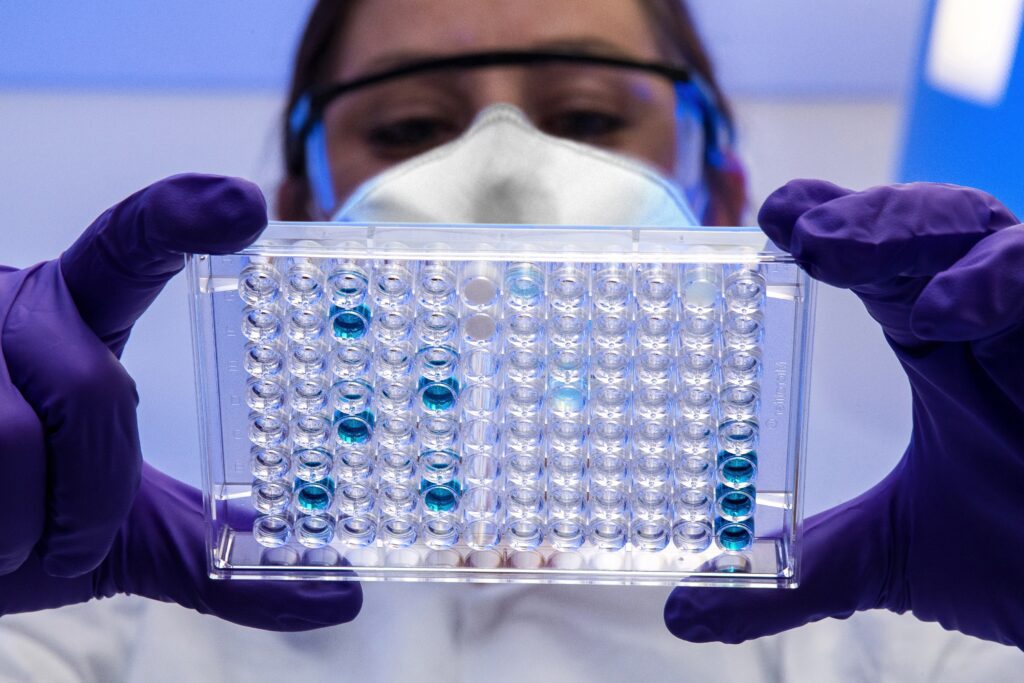Should I Have PGS Testing on My Embryos?

Preimplantation Genetic Screening (PGS), also referred to as Preimplantation Genetic Testing for Aneuploidies (PGT-A), is a procedure used in IVF (In Vitro Fertilization) to screen embryos for chromosomal abnormalities. This process helps intended parents make informed decisions about transferring embryos with the highest chances of developing into healthy pregnancies.
In this article, we’ll explore what PGS testing is, its benefits, its risks, and who should consider it.
Begin your surrogacy journey with IVF Conceptions today!
Mobile: +91-8800481100 ( WhatsApp, Line, Viber)
Email: neelam@ivfconceptions.com
What is PGS Testing?
What Is PGS Testing?
PGS testing is a genetic test performed on embryos created during IVF before they are transferred to the uterus. It analyzes the number of chromosomes in each embryo, checking for aneuploidy—an abnormal number of chromosomes. Healthy embryos should have 46 chromosomes, with 23 inherited from each parent.
Key Terms:
- Aneuploidy: An abnormal number of chromosomes, which can lead to developmental issues or miscarriage.
- PGT-A: Preimplantation Genetic Testing for Aneuploidies, another name for PGS.
- IVF: In Vitro Fertilization, a process where eggs are fertilized by sperm outside the body.
Who Should Consider PGS Testing?
PGS testing is not necessary for all IVF patients, but certain groups may benefit more than others. If you fall into one of these categories, you might want to consider PGS testing:
|
Category |
Why PGS Might Be Beneficial |
|
Women Over 35 |
Higher risk of chromosomal abnormalities in embryos as maternal age increases. |
|
History of Recurrent Miscarriages |
Recurrent miscarriages can often be caused by chromosomal abnormalities. |
|
Multiple Failed IVF Cycles |
If previous IVF attempts have failed, PGS testing may help identify viable embryos with a better chance of success. |
|
Severe Male Factor Infertility |
Poor sperm quality may increase the risk of chromosomal abnormalities. |
|
Known Genetic Disorders |
If one or both partners carry a known genetic disorder, PGS can help prevent passing it on to the child. |
 Benefits of PGS Testing:
Benefits of PGS Testing:
- Increased Success Rates
By selecting chromosomally normal embryos, the likelihood of a successful pregnancy increases. This is especially crucial for women over 35 or those with recurrent miscarriages. - Reduced Risk of Miscarriage
Many miscarriages are caused by chromosomal abnormalities. Screening embryos with PGS can help reduce the risk of early pregnancy loss. - Lower Risk of Multiple Pregnancies
Transferring a single, healthy embryo can reduce the risk of multiple births, which are associated with higher risks for both mother and babies. - Better Family Planning
For families looking to limit the number of IVF cycles or who wish to select the healthiest embryos, PGS provides greater control over the process.
What Are the Risks of PGS Testing?
While PGS testing offers several benefits, it is not without risks. Consider these factors before opting for the test:
- Cost: PGS testing can add significant expense to your IVF cycle. It’s important to weigh the benefits against the additional financial burden.
- Embryo Loss: Although rare, there is a small risk that an embryo could be damaged during the biopsy process.
- False Positives/Negatives: No genetic test is 100% accurate. There is a small chance of receiving a false result, which could lead to the discarding of a viable embryo or the transferring of an abnormal one.
Related surrogacy Costs guides:
What is the average surrogacy cost?
How much does surrogacy cost in Ukraine?
How much does surrogacy cost in Georgia?
How much does surrogacy cost in India?
What is the Surrogacy Cost in Colombia?
What is Surrogacy cost in Mexico?
What is surrogacy cost with family members?

What is the difference between PGS and PDG?
Pre-genetic screening (PGS) analyses biopsied cells from the embryo to screen for potential genetic abnormalities when there are no known potentially inherited disorders.
On the other hand, pre-genetic diagnosis (PGD), uses the same process to detect a specific disorder that has a high probability of being passed down from parents to their offspring.
A new technique called Next-generation sequencing (NGS) which is DNA sequencing using the concept of massively parallel processing is gaining lots of traction and many advanced fertility clinics are opting for the NGS technique for genetic testing.
NGS is the latest evolutionary genetic analysis technology that allows the lab to perform extensive chromosome scanning on the embryo. With NGS, embryos are screened quickly and efficiently, and genetic problems at the chromosome level are detected before pregnancy.
How Is PGS Testing Performed?
PGS testing is typically done on Day 5 or 6 of embryo development, known as the blastocyst stage. Here’s an overview of the procedure:
- IVF Procedure
The process starts with a typical IVF cycle, where eggs are retrieved and fertilized with sperm in the lab. - Embryo Biopsy
A few cells are carefully removed from each embryo. This is done without harming the embryo, which continues to develop. - Genetic Testing
The biopsied cells are sent to a lab where the number of chromosomes is analyzed. - Embryo Freezing
After the biopsy, the embryos are frozen while waiting for the test results. - Embryo Transfer
Once the results are available, the healthiest embryos are selected for transfer.
|
Steps |
Description |
|
IVF Process |
Eggs are fertilized in the lab through IVF. |
|
Embryo Biopsy |
A few cells are taken from each embryo for testing. |
|
Genetic Analysis |
Biopsied cells are analyzed for chromosomal abnormalities. |
|
Freezing Embryos |
Embryos are frozen after biopsy while waiting for results. |
|
Embryo Transfer |
Only healthy embryos with normal chromosome numbers are transferred into the uterus. |
Is PGS Testing Worth It?
Whether or not to undergo PGS testing depends on your individual circumstances. Here are some considerations:
When PGS Testing May Be Worth It:
- You’re Over 35
As maternal age increases, so does the risk of chromosomal abnormalities. - Previous Pregnancy Loss
If you’ve experienced miscarriages due to genetic issues, PGS can help identify healthy embryos. - Male Factor Infertility
In cases of severe sperm abnormalities, PGS can help select the best embryos.
When It Might Not Be Necessary:
- Young, Healthy Couples
If both partners are young and have no known genetic issues, PGS may not be necessary. - Limited Budget
If cost is a major concern and you’re not in a high-risk group, the financial burden may outweigh the benefits.
Factors to consider before planning for PGS?
Whether or not to have PGS testing on your embryos is a personal decision that should be made after considering your individual circumstances and goals.
Here are a few things to consider before doing PGS:
#1. Your age:
The older you are, the more likely it is that your eggs or sperm will have chromosomal abnormalities. If you are over the age of 35 and are considering IVF, you may want to consider PGS testing to increase the chances of having a healthy pregnancy.
It goes without saying that with aging the mutation goes up and so does the chance of having genetically abnormal embryos.
#2. Your medical history:
If you have a history of recurrent miscarriages or infertility, or if you or your partner have a family history of genetic disorders, you may want to consider PGS testing to increase the chances of having a healthy pregnancy.
In the case of genetic history from either side of the would-be parents, it is recommended to opt for genetic testing to exclude the possibility of passing faulty genes to the next generation.
#3. Your personal values:
PGS testing can help you to identify embryos that are more likely to develop into healthy pregnancies, but it cannot guarantee a successful outcome.
If you are comfortable with the risks and uncertainties involved in pregnancy and childbirth, you may decide not to have PGS testing.
Ultimately, the decision of whether or not to have PGS testing on your embryos is a personal one that should be based on your individual circumstances and goals.
Besides this, pay attention to the advice of your fertility specialist as your doctor he/she knows your specific case, past medical histories, and failed IVF cycles. After that, carefully consider the potential risks and benefits of PGS testing before making a decision.
Read more:
Can I use both an egg donor and sperm donor for my surrogacy journey
Is a surrogate genetically related to the baby?
What is the average cost of surrogacy
Who Should Get PGS Tested?
Preimplantation genetic diagnosis (PGD) is a laboratory test that is used to evaluate the genetic makeup of embryos produced through in vitro fertilization (IVF).
The test is typically used to identify specific genetic disorders or other inherited conditions that may be present in the embryos.
PGD is usually recommended for people who are at risk of passing on a genetic disorder or other inherited condition to their children. This may include people who:
- Have a family history of a specific genetic disorder or other inherited condition
- Have a personal history of a specific genetic disorder or other inherited condition
- Are carriers of a genetic mutation that could be passed on to their children
- Have had children with a genetic disorder or other inherited condition
- The couple had failed IVF cycles in the past. This is also known as unexplained infertility.
- A female had multiple miscarriages and there is no clear explanation for the same.
Overall, PGD is a specialized test that is used to identify specific genetic disorders or other inherited conditions in embryos. It is usually recommended for people who are at risk of passing on these conditions to their children, but it may not be right for everyone.
PGD is usually not recommended for people who do not have a specific risk of passing on a genetic disorder or other inherited condition.
If you are considering PGD, it is important to discuss your options with your fertility specialist and to carefully consider the potential risks and benefits of the test before making a decision.
Alternative Genetic Testing Options
PGS is one of several genetic testing options available during IVF. Others include:
|
Test Type |
Description |
When to Use |
|
PGD (Preimplantation Genetic Diagnosis) |
Tests for specific genetic disorders, such as cystic fibrosis or sickle cell anemia. |
Couples with a family history of a specific genetic condition. |
|
Carrier Screening |
Tests both partners to determine if they carry recessive genetic conditions. |
Useful for couples with known family history of genetic conditions. |
|
Non-Invasive Prenatal Testing (NIPT) |
A blood test performed during pregnancy to assess the baby’s risk for certain genetic conditions. |
Performed after a pregnancy is established. NIPT cannot replace PGS, but may complement it. |
Conclusion
PGS testing offers several benefits, especially for couples at higher risk of chromosomal abnormalities. It can increase the chance of a successful pregnancy, reduce miscarriage risks, and help families make informed decisions.
However, it also comes with added costs and some risks. If you’re considering PGS testing, consult your fertility specialist to determine whether it’s right for your situation.
By weighing the benefits and risks, you can make the best decision for your fertility journey.
If you’d like to learn more about IVF, Egg Donation, or surrogacy services globally, check out the rest of our website at IVF Conceptions. We offer legally secure and affordable surrogacy consulting services for FREE.
Begin your surrogacy journey with IVF Conceptions today!
Mobile: +91-8800481100 ( WhatsApp, Line, Viber)
Email: neelam@ivfconceptions.com

 Benefits of PGS Testing:
Benefits of PGS Testing:

